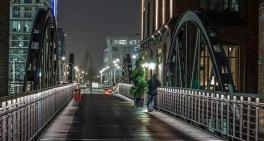Supreme Court sends Florida cross case back to lower court
Criminal Law
Court decisions directing the removal of a cross from a public park in Florida should get another look, after a Supreme Court ruling that upheld a different cross in Maryland, the high court said Friday.
The justices sent the Florida case back to a lower court to decide whether previous decisions that the cross should be removed were correct or if the cross should stay given the Supreme Court’s latest opinion.
In the Maryland case decided last week, the justices let stand a war memorial in the shape of a cross that is located on a public highway median and maintained by public officials. The approximately 40-foot-tall cross was completed in 1925 and honors soldiers who died in World War I. Seven of the court’s nine justices sided with supporters of the cross in ruling it should stand.
A majority of justices signed on to an opinion written by Justice Samuel Alito that said “when time’s passage imbues a religiously expressive monument, symbol or practice with this kind of familiarly and historical significance, removing it may no longer appear neutral.” Alito also wrote that the Maryland cross’ connection to World War I was important in upholding it because crosses, which marked the graves of American soldiers, became a symbol closely linked to the war.
The Florida case involves a cross that was first put up in Pensacola’s Bayview Park in 1941 for a community Easter service. It has been the site of annual Easter services since. The cross was at first made of wood but was replaced in 1969 by a 34-foot-tall concrete cross.
The Wisconsin-based Freedom From Religion Foundation and the Washington-based American Humanist Association sued over the cross on behalf of four current or former residents, arguing that it violates the establishment clause of the First Amendment, which prohibits the government from favoring one religion over others. A trial court and appeals court agreed.
Luke Goodrich, an attorney at the Washington-based Becket Fund For Religious Liberty, which is representing the city of Pensacola and defending the cross, said he believes the Supreme Court’s recent Maryland case is “very helpful” to their case. He pointed to a line in Alito’s opinion that suggests a “presumption of constitutionality for longstanding monuments, symbols and practices.” And he said the cross is “part of the history and culture of the city of Pensacola.” While the Pensacola cross was not, like the Maryland cross, put up to memorialize World War I veterans, it was put up on the eve of World War II and has become a gathering place, Goodrich said.
Related listings
-
NC redistricting fight turns to state courts after ruling
Criminal Law 06/25/2019Now that the U.S. Supreme Court has ruled federal courts aren’t the place to settle partisan gerrymandering disputes, opponents of North Carolina’s district maps are putting their hopes in state courts.An election reform group, the state ...
-
NC redistricting fight turns to state courts after ruling
Criminal Law 06/25/2019Now that the U.S. Supreme Court has ruled federal courts aren’t the place to settle partisan gerrymandering disputes, opponents of North Carolina’s district maps are putting their hopes in state courts.An election reform group, the state ...
-
Supreme Court sends Florida cross case back to lower court
Criminal Law 06/21/2019Court decisions directing the removal of a cross from a public park in Florida should get another look, after a Supreme Court ruling that upheld a different cross in Maryland, the high court said Friday.The justices sent the Florida case back to a lo...

Can my trucking injury case be filed in Illinois?
If you have been injured in a truck driving accident, you may be wondering whether your worker’s comp case can be filed in Illinois. For an injured truck driver, this is an important question to ask, as the jurisdiction of the case can end up having a big impact on your benefits.
There are three main scenarios in which the Illinois Worker’s Compensation Commission would have jurisdiction over a trucking injury:
-If the accident took place in Illinois, If the employer is principally located in Illinois, or If the contract for hire is in Illinois
This means that a truck driver whose home terminal is in Illinois can make a claim for workers comp benefits in Illinois even if they were injured while on the road in another State. It also means that truck drivers who get hurt while passing through Illinois can file a claim in Illinois, even if their employer is located in another state.
If you have been injured on the road, and you are unsure where and how to file your workers comp claim, call us at (312)-726-5567 to begin your consultation. We can advise you whether Illinois is the right state to file for you. We have handled well over 30,000 claims for injured workers throughout the state of Illinois.




